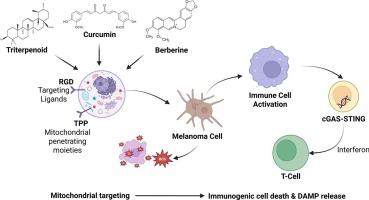Natural products nanocarriers: A perspective on precision immunotherapy for melanoma via mitochondrial targeting
IF 4
2区 农林科学
Q2 FOOD SCIENCE & TECHNOLOGY
引用次数: 0
Abstract
Melanoma remains highly aggressive and resistant to current immunotherapies, partly due to mitochondrial metabolic reprogramming, which fosters an immunosuppressive tumor microenvironment. This perspective highlights a novel precision immunotherapy approach using mitochondria-targeted nanocarriers for delivering immunomodulatory natural products. Bioactive phytochemicals like curcumin, berberine, and Raddeanin A possess intrinsic mitochondrial tropism and stimulate immune responses by inducing apoptosis, generating reactive oxygen species, and triggering mitochondrial DNA release. However, their clinical utility is limited by poor bioavailability and specificity. Advanced nanocarriers, including MITO-Porters, polymeric nanoparticles, and mitochondria-homing metal-organic frameworks, enhance selective mitochondrial targeting, bioavailability, and controlled release, significantly amplifying antitumor immunity and reducing off-target toxicity. This integrative strategy combining mitochondrial biology, natural product pharmacology, and nanomedicine holds significant translational potential, offering a promising therapeutic paradigm to overcome melanoma immunoresistance.

天然产物纳米载体:通过线粒体靶向治疗黑色素瘤的精准免疫治疗前景
黑色素瘤对目前的免疫疗法仍然具有高度侵袭性和耐药性,部分原因是线粒体代谢重编程促进了免疫抑制的肿瘤微环境。这一观点强调了一种使用线粒体靶向纳米载体递送免疫调节天然产物的新型精确免疫治疗方法。生物活性植物化学物质如姜黄素、小檗碱和芦花苷A具有内在的线粒体趋向性,并通过诱导细胞凋亡、产生活性氧和触发线粒体DNA释放来刺激免疫反应。然而,它们的临床应用受到生物利用度和特异性差的限制。先进的纳米载体,包括mito - porter,聚合物纳米颗粒和线粒体归巢金属有机框架,增强线粒体选择性靶向,生物利用度和控释,显著增强抗肿瘤免疫和减少脱靶毒性。这种结合线粒体生物学、天然产物药理学和纳米医学的综合策略具有重要的转化潜力,为克服黑色素瘤免疫抗性提供了一种有希望的治疗范例。
本文章由计算机程序翻译,如有差异,请以英文原文为准。
求助全文
约1分钟内获得全文
求助全文
来源期刊

Journal of Functional Foods
FOOD SCIENCE & TECHNOLOGY-
CiteScore
9.60
自引率
1.80%
发文量
428
审稿时长
76 days
期刊介绍:
Journal of Functional Foods continues with the same aims and scope, editorial team, submission system and rigorous peer review. We give authors the possibility to publish their top-quality papers in a well-established leading journal in the food and nutrition fields. The Journal will keep its rigorous criteria to screen high impact research addressing relevant scientific topics and performed by sound methodologies.
The Journal of Functional Foods aims to bring together the results of fundamental and applied research into healthy foods and biologically active food ingredients.
The Journal is centered in the specific area at the boundaries among food technology, nutrition and health welcoming papers having a good interdisciplinary approach. The Journal will cover the fields of plant bioactives; dietary fibre, probiotics; functional lipids; bioactive peptides; vitamins, minerals and botanicals and other dietary supplements. Nutritional and technological aspects related to the development of functional foods and beverages are of core interest to the journal. Experimental works dealing with food digestion, bioavailability of food bioactives and on the mechanisms by which foods and their components are able to modulate physiological parameters connected with disease prevention are of particular interest as well as those dealing with personalized nutrition and nutritional needs in pathological subjects.
 求助内容:
求助内容: 应助结果提醒方式:
应助结果提醒方式:


